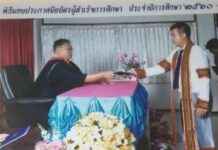Understanding the Implications of the Constitutional Check Bill
The Constitutional Check Bill has sparked debates and discussions across the political spectrum in Thailand. This bill aims to address the issue of power inheritance and the lack of democratic processes in drafting the constitution. It is designed to cater to the needs of a specific group rather than truly listening to the voice of the people. The current constitution, in place for seven years, has been criticized for perpetuating power inheritance and authoritarianism.
Critics argue that the current administration has continued the trend of consolidating power rather than promoting genuine democracy. The transition from “Uncle Tuu” to a military junta, and now to a government led by “Uncle Pohk,” has raised concerns about the lack of accountability and transparency in governance. The political landscape, with both major and minor parties, has witnessed a cycle of power struggles and dubious activities.
The Legacy of Power Inheritance
The issue of power inheritance is deeply rooted in Thai politics, dating back to the drafting of the 1968 constitution. Over the years, the constitution has been manipulated to serve the interests of those in power, rather than the welfare of the people. The current administration’s use of the forest monastery for political activities has raised questions about the misuse of public resources for personal gain.
The concept of power inheritance is evident in the political landscape, with senior politicians passing on their influence and control to younger generations. The current administration’s control over all branches of government has led to concerns about the concentration of power in the hands of a few individuals. The recent actions of the government, including the suppression of dissent and the targeting of political opponents, have raised alarms about the erosion of democratic principles.
The Need for Constitutional Reform
The call for constitutional reform has become increasingly urgent in light of the challenges facing Thailand. The current constitution, drafted in 2560 BE, was intended to prevent corruption and abuse of power. However, there have been calls to amend the qualifications for ministers to ensure they uphold ethical standards and integrity.
The criteria for ministerial positions should include honesty, integrity, and adherence to moral standards. Individuals with a history of corruption or ethical violations should be barred from holding public office. The current administration’s track record of misconduct and abuse of power underscores the need for stringent criteria in selecting government officials.
In conclusion, the Constitutional Check Bill represents a critical juncture in Thailand’s political landscape. The bill’s implications extend beyond mere constitutional amendments to encompass the broader issues of power inheritance, democratic governance, and ethical leadership. It is imperative for the government to heed the calls for reform and prioritize the interests of the people above personal gain. Only through genuine democratic processes and ethical leadership can Thailand pave the way for a more transparent and accountable future.




















